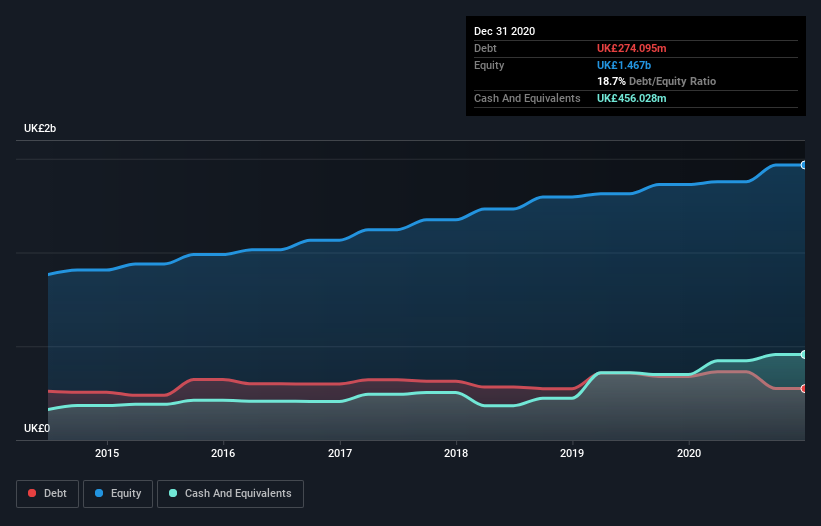- United Kingdom
- /
- Trade Distributors
- /
- LSE:GFTU
Grafton Group (LON:GFTU) Has A Pretty Healthy Balance Sheet

Some say volatility, rather than debt, is the best way to think about risk as an investor, but Warren Buffett famously said that 'Volatility is far from synonymous with risk.' It's only natural to consider a company's balance sheet when you examine how risky it is, since debt is often involved when a business collapses. As with many other companies Grafton Group plc (LON:GFTU) makes use of debt. But the more important question is: how much risk is that debt creating?
Why Does Debt Bring Risk?
Debt and other liabilities become risky for a business when it cannot easily fulfill those obligations, either with free cash flow or by raising capital at an attractive price. If things get really bad, the lenders can take control of the business. However, a more common (but still painful) scenario is that it has to raise new equity capital at a low price, thus permanently diluting shareholders. Of course, the upside of debt is that it often represents cheap capital, especially when it replaces dilution in a company with the ability to reinvest at high rates of return. When we think about a company's use of debt, we first look at cash and debt together.
View our latest analysis for Grafton Group
How Much Debt Does Grafton Group Carry?
As you can see below, Grafton Group had UK£274.1m of debt at December 2020, down from UK£339.3m a year prior. But it also has UK£456.0m in cash to offset that, meaning it has UK£181.9m net cash.

How Healthy Is Grafton Group's Balance Sheet?
We can see from the most recent balance sheet that Grafton Group had liabilities of UK£634.5m falling due within a year, and liabilities of UK£880.8m due beyond that. Offsetting this, it had UK£456.0m in cash and UK£337.2m in receivables that were due within 12 months. So it has liabilities totalling UK£722.0m more than its cash and near-term receivables, combined.
Grafton Group has a market capitalization of UK£2.86b, so it could very likely raise cash to ameliorate its balance sheet, if the need arose. However, it is still worthwhile taking a close look at its ability to pay off debt. Despite its noteworthy liabilities, Grafton Group boasts net cash, so it's fair to say it does not have a heavy debt load!
But the other side of the story is that Grafton Group saw its EBIT decline by 3.6% over the last year. If earnings continue to decline at that rate the company may have increasing difficulty managing its debt load. There's no doubt that we learn most about debt from the balance sheet. But ultimately the future profitability of the business will decide if Grafton Group can strengthen its balance sheet over time. So if you want to see what the professionals think, you might find this free report on analyst profit forecasts to be interesting.
Finally, a business needs free cash flow to pay off debt; accounting profits just don't cut it. While Grafton Group has net cash on its balance sheet, it's still worth taking a look at its ability to convert earnings before interest and tax (EBIT) to free cash flow, to help us understand how quickly it is building (or eroding) that cash balance. Over the last three years, Grafton Group actually produced more free cash flow than EBIT. That sort of strong cash generation warms our hearts like a puppy in a bumblebee suit.
Summing up
While Grafton Group does have more liabilities than liquid assets, it also has net cash of UK£181.9m. And it impressed us with free cash flow of UK£279m, being 103% of its EBIT. So we are not troubled with Grafton Group's debt use. The balance sheet is clearly the area to focus on when you are analysing debt. But ultimately, every company can contain risks that exist outside of the balance sheet. For instance, we've identified 1 warning sign for Grafton Group that you should be aware of.
Of course, if you're the type of investor who prefers buying stocks without the burden of debt, then don't hesitate to discover our exclusive list of net cash growth stocks, today.
When trading Grafton Group or any other investment, use the platform considered by many to be the Professional's Gateway to the Worlds Market, Interactive Brokers. You get the lowest-cost* trading on stocks, options, futures, forex, bonds and funds worldwide from a single integrated account. Promoted
New: Manage All Your Stock Portfolios in One Place
We've created the ultimate portfolio companion for stock investors, and it's free.
• Connect an unlimited number of Portfolios and see your total in one currency
• Be alerted to new Warning Signs or Risks via email or mobile
• Track the Fair Value of your stocks
This article by Simply Wall St is general in nature. It does not constitute a recommendation to buy or sell any stock, and does not take account of your objectives, or your financial situation. We aim to bring you long-term focused analysis driven by fundamental data. Note that our analysis may not factor in the latest price-sensitive company announcements or qualitative material. Simply Wall St has no position in any stocks mentioned.
*Interactive Brokers Rated Lowest Cost Broker by StockBrokers.com Annual Online Review 2020
Have feedback on this article? Concerned about the content? Get in touch with us directly. Alternatively, email editorial-team (at) simplywallst.com.
About LSE:GFTU
Grafton Group
Engages in the distribution, retailing, and manufacturing businesses in Ireland, the Netherlands, Finland, and the United Kingdom.
Very undervalued with flawless balance sheet and pays a dividend.

